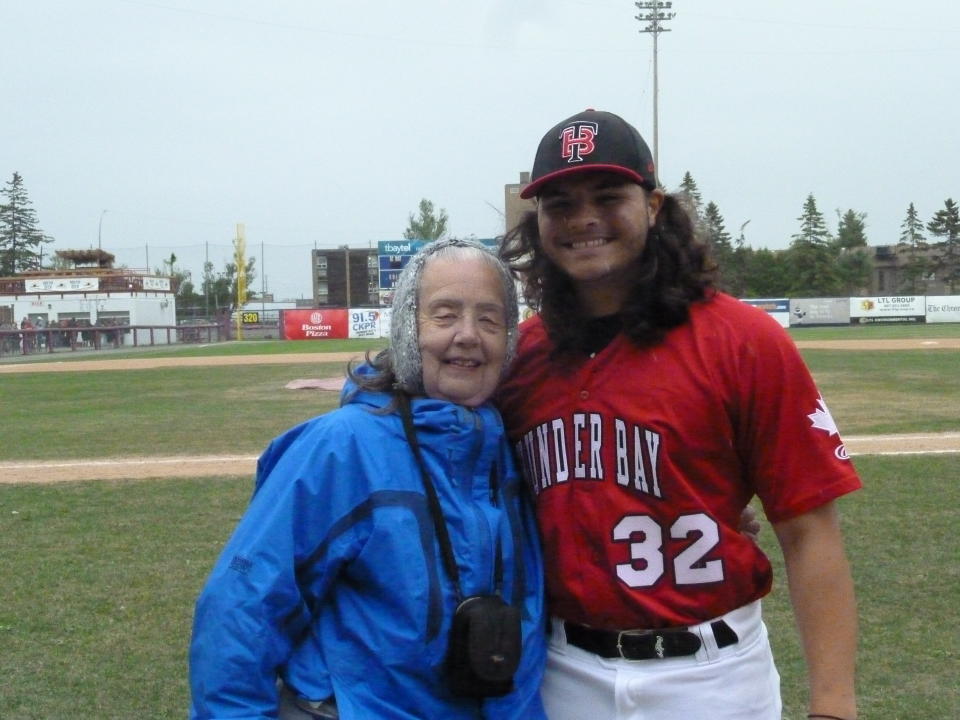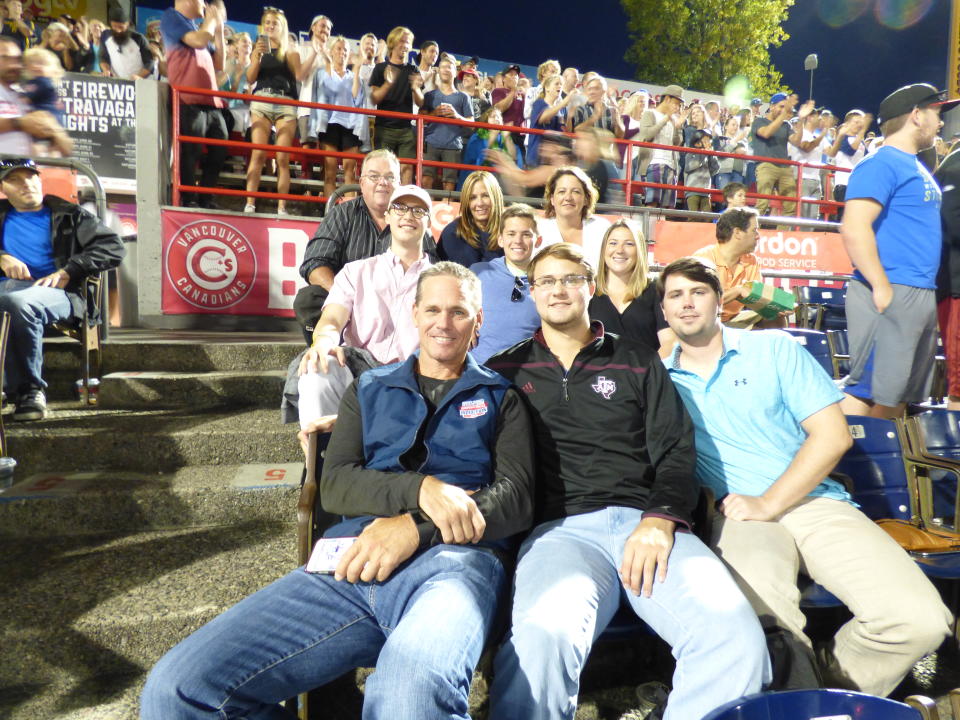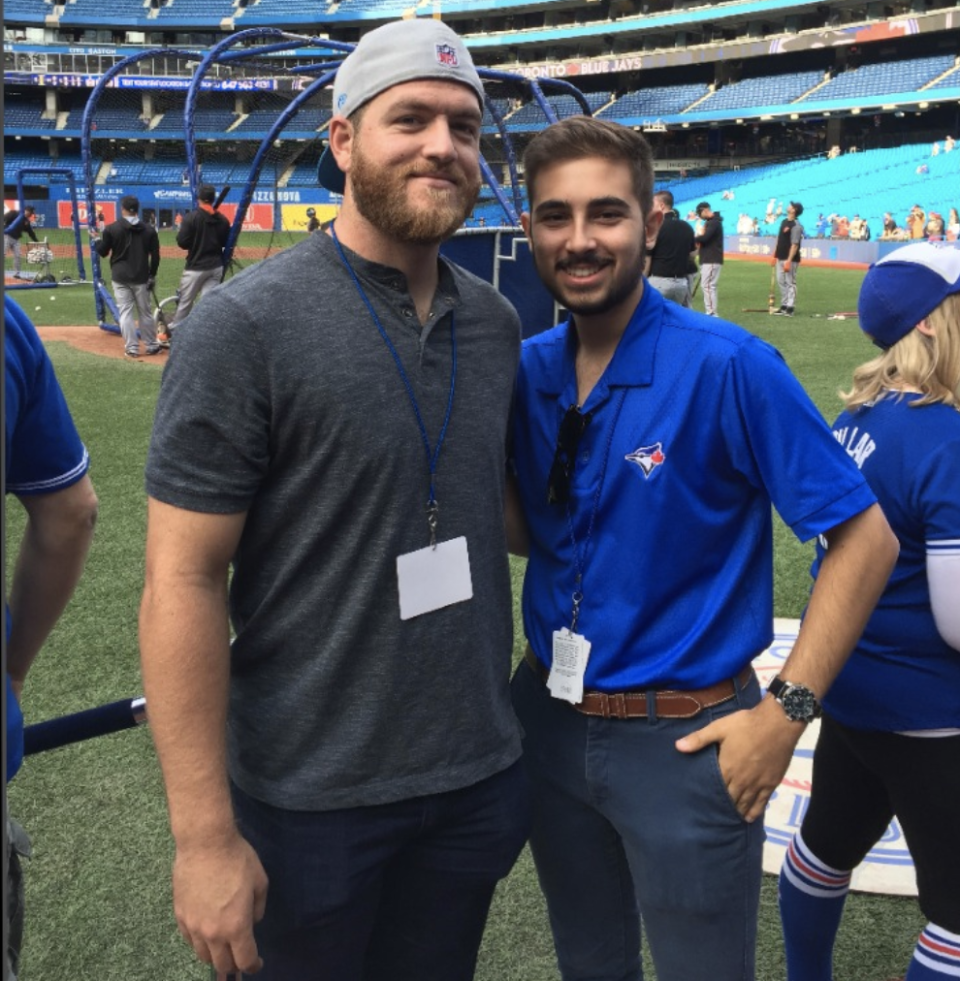Canadian families fill a vital role in baseball's flawed ecosystem

Even though MLB players make millions — or hundreds of millions — and owners bring in even more, a common denominator across most levels of baseball is the absence of cash.
Whether it’s the malicious suppression of minor-league salaries, the NCAA’s unwillingness to pay athletes, or the revenue limitations of independent ball, the vast majority of baseball players can’t get paid until they get paid.
Aspiring players are left far from home, without livable incomes, fighting to make it to the highest level. Whether it’s minor leaguers making approximately $1,200, Indy Ball players getting as little as $750, or college athletes bringing in nothing, it’s simply not enough. That creates a tenuous situation that often requires outside support to be feasible, which is where host families come in.
Rather astonishingly, every year folks across North America open their homes to strangers in support of long-shot baseball dreams they have no prior investment in.
Toronto Blue Jays catcher Danny Jansen came from one of those families. The Jansens lived in Appleton, Wisc., less than a mile from the ballpark of the Wisconsin Timber Rattlers — currently the Milwaukee Brewers’ single-A affiliate. For 12 years they adopted a player each summer, most famously five-time MLB All-Star Adam Jones, who Jansen reunited with in the big leagues last season.
Hey @D_Jansen31 why you gotta grow up on me!!!!! pic.twitter.com/jtxHWWgQXS
— 10 (@SimplyAJ10) August 21, 2018
“They were my role models,” Jansen says. “I always looked up to them. I always loved being around them, waking up and playing video games with them in the morning, bugging them when I was young. They were always good to me.”
Jansen is still in contact with many of the players that came through his home, wherever their journey took them. The Jansens’ first summer adoptee, for instance, went on to become the San Antonio Spurs director of basketball strategy.
“Our first player was a guy named Phil Cullen, who’s with the Spurs now. I actually saw him for the first time in 15 years two off-seasons ago,” Jansen says. “He had a special place in my parents’ hearts. He broke his arm in the middle of the season and didn’t want to go home. He wanted to stay with us and be around the game and my family took such good care of him and loved him. He stayed with us all summer.”
[Join or create a 2019 Yahoo Fantasy Football league for free today]
These are the type of improbable bonds that form from an improbable arrangement — one borne of generosity, a passion for baseball, and little else. It’s a situation made a little more complicated when it takes place north of the 49th parallel, a land more foreign to Americans than many Canucks realize.
Thunder Bay Border Cats pitcher Trent Valentine remembers the nerves he had coming to Canada when he joined the Northwoods League summer team.
“I usually travel to tropical countries, like Dominican Republic or Aruba, but I’d never been to Canada in my life,” he says. “So doing that by myself, without my family, wasn’t something I was used to.”
The Hopewell Junction, N.Y., native found himself a little out of his depth early in his stay in Northern Ontario.
“The street signs are really different,” he says. “So the first time I was walking to the baseball diamond I was really confused about where to go.”
Luckily, Valentine found himself in the capable hands of Marty Sauer, a veteran host mom who’s been putting up Border Cats for close to a decade.

“I had an aunt Eda who was always looking for someone to go to Wrigley Field with,” Sauer explains. “So I grew up at Wrigley Field. Baseball has been in my blood since I was a little kid.”
Because Sauer grew up in Chicago, she feels especially well-equipped to help American ballplayers adjust to Canada’s idiosyncrasies. First and foremost, that means making sure they take their shoes off when they enter someone’s house, a ritual she describes as a “Canadian institution.” She also makes sure her players get a little bit of a culinary education on Thunder Bay favourites like perogies and Finnish pancakes. That education certainly took for Valentine, who now describes perogies as his “favourite food.”
Although Sauer’s players have had a few things to learn about the Great White North, she’s always found them respectful and receptive.
“They haven’t been what people would call the arrogant American,” she says. “The boys I’ve had have been really well-mannered boys. They’ve been very polite.”
While Sauer might be one of the best host mothers in the country, she’s not the most prolific. That title might go to Carol Irving, whose home has been a safe port of call for literally dozens of members of the Vancouver Canadians — a Blue Jays single-A affiliate. Once Irving began taking in ballplayers, it became a habit she couldn’t break.
“We took two players and we said ‘Ok that’s it, though. They were too good and I know I’m not going to get two more boys as good, so I’m going to stop,’” she says. “So then I continued, and about 46 players later, here I am.”
For all the time and effort she put into feeding and housing player after player, she was rewarded with relationships that have persisted far past their time in Vancouver.
“We’ve been invited to four weddings; we’ve been to two,” Irving says. “When they have babies, or are pregnant they let us know. Three of them on Mother’s Day sent me “Happy Mother’s Day” messages. One, I had 10 or 12 years ago, lived in New York and he texted me and said, ‘Hey mom, is the Irving Hotel still open?’ And I said ‘Absolutely,’ so him and a buddy came out for a week.”
The Irving Hotel’s most famous guest to date is Blue Jays rookie Cavan Biggio. Biggio stayed with the Irvings just two weeks after he’d been picked in the fifth round of the 2016 draft. The 24-year-old appreciated the balance the family struck between including him without imposing on him.
“You’re in a totally new country and they had to provide the housing and the food but your space too,” he says. “Because you’re trying to figure things out on your own.”

“He was such a down-to-earth kid,” Irving says about the up-and-comer. “I texted him a couple times when he got his grand slam and he texted me right back.”
While Biggio’s family was able to visit on occasion, Vancouver was pretty remote for the then-21-year-old. It wasn’t difficult for him to feel isolated at times approximately 3,000 kilometres away from his home of Houston. The Irvings made sure those moments were fleeting.
“They gave me a sense of family in a totally different country,” Biggio says. “When my family was far away.”

Whether her players make it big, like Biggio, or have to find another path, Irving is effusive in her praise of the arrangement, especially as it pertains to her kids.
“I’ve tried to tell people how great it is. It’s good for the kids to see the respect that the players show. Honestly, my son went and played junior hockey and he had to live with a family and I think he wanted to experience the other side. And he knew exactly what to do and what not to do because he knew my rules.”
The relationships players form with the children of host families are often the best thing to come out of their stay. That was certainly the case for Dante De Caria, the play-by-play broadcaster for the Ottawa Champions of the Can-Am league. De Caria and his mother, Mary, hosted a number of Champions, which is how Dante found his current “best, best, friend” Andrew Cooper.
De Caria was an only child who’d always felt like he was missing a sibling. When the affable right-hander moved into his house he got himself a brother.
“To have someone come into my house who played baseball, that I could look up to and learn from was one of the best things that happened to me in my life,” De Caria says. “It was an awesome experience.”

Although the young broadcaster has reaped life-changing benefits from his host family experience, he also sees some of the issues with the arrangement. The system is in place to help lessen the financial burden on the players, but it has to fall somewhere. That means it lands right on the families.
That simple fact, more than anything else, has caused the host family program in Ottawa to dwindle in recent years. During the 2019 season, the number of players being put up went all the way down to one — catcher Andy Mocahbee. The 25-year-old describes his situation as “perfect” and hopes to be back if he returns to the Champions, but neither of those things are a given — and it wouldn’t be a shock if the whole program is shuttered in 2020.
That’s a shame for Ottawa, because having the host family option can help attract players in the first place. Les Capitales de Quebec pitcher Austin Chrismon spent three-and-a-half years with the Champions, and the lure of a host family played a major role in his initial decision to come north, a major step for a guy who didn’t even have a passport at the time.
“After I was released by the Houston Astros I was contacted by a few independent ball teams. And one of the questions when trying to pick a team was, ‘Would there be a host family available?’ Independent ball players and minor league players don’t make a bunch to pay rent, and I had student loans and a car with me.”
Even in places where these programs are doing better, it’s difficult to offer prospective families a good incentive to get involved. Vancouver has become a particularly difficult market in this respect. For every Carol Irving, there are dozens of families who are on the fence, who can unsurprisingly find uses of the empty space in their homes that offer more tangible benefits.
“With the price of real estate in Vancouver, Airbnbs, and foreign students coming, and what host families can get to rent their place out, it’s become a little tougher to get new families and we need ‘em,” says Canadians general manager Allan Bailey. “This year it was a bit of struggle. We don’t have much compensation to offer them.”
The compensation Bailey is referring to includes things like season’s tickets, discounts on memorabilia and concessions, as well as host family barbecues. For many, it’s hard for that to measure up to the thousands of dollars they can get from renting out a room in Vancouver. The out-of-control real estate market in the city is simultaneously why ballplayers need families to stay with and why the same families may hesitate to host them — and when they do get a family they literally can’t afford to lose them.
“We tell our players, ‘Treat your host families as well as you possibly can because all the families talk and no other host family will take you,’” Bailey says. “You’ll be looking at $3,000 a month for a furnished apartment.”
In Thunder Bay, a calmer real estate situation puts less pressure on the process, but some of the same issues exist. The Border Cats are offering similarly modest incentives — season’s tickets, discounts, etc. — and counting on the kindness of local families to ensure all their players are sorted.
“At the start of the season we were scrambling for host families. I’ve talked to other host family coordinators in the league. It’s kind of a thing,” host family coordinator Roger Rickards says. “If you’ve never done it, you’re panicking. You kind of roll with it until a week before opening day.”
So far, the residents of the Northern Ontario city have come through without fail, but Rickards’ last-minute game of musical chairs is a fragile one.
The whole host family enterprise is awfully delicate. Baseball’s flawed ecosystem doesn’t allow players to be self-sufficient, so they need their teams to provide them the necessities of life. Those teams in turn need local families to show generosity to strangers that far exceeds the rewards they can offer. Then those families actually have to provide a good home for the players. It seems like there are enough cogs in that machine that one of them would fall apart somewhere along the line.
Yet not only does the whole thing chug along, it generates life-changing experiences for everyone involved. All across Canada, dozens of families are thanklessly and quietly fuelling the outlandish dreams of young men, almost exclusively from another country — and getting very little for their efforts.
More often than not, they’re enjoying every minute of it.
More baseball coverage from Yahoo Sports



